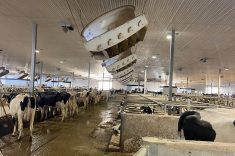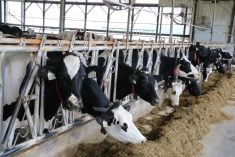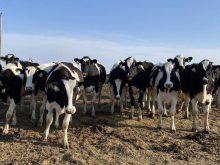Certificate provides benefits | Producers must be validated by Jan. 31 to be eligible for bonuses and incentives
Carla Soutar has visited three-quarters of British Columbia’s 526 dairy farms, logging thousands of kilometres on her vehicle in the process.
She plans to stop in on the other 150 farms by Sept.1.
As producer services co-ordinator for the B.C. Dairy Association, Soutar’s job is training dairy producers how to use the Canadian Quality Milk (CQM) program.
“Improved standards means higher quality milk,” she said from her vehicle, after visiting her 376th dairy farm July 13.
The CQM becomes mandatory for all dairy producers in the province Jan. 31.
Read Also

Charges laid after cattle theft
Saskatchewan RCMP lay two charges against a man after six cattle went missing.
Developed by the Dairy Farmers of Canada and now in its 15th year, the program is an on-farm food safety program designed to help producers prevent, monitor and reduce food safety risks on their farms.
Focused on preventing and minimizing the risk of food safety hazards, the program is recognized by the Canadian Food Inspection Agency as being technically sound and based on science.
B.C. became the ninth province to join the national program in 2006. Saskatchewan remains the lone province that does not have a mandatory date set and few producers in the program.
Soutar spends about an hour on each farm explaining the program’s requirements and finding ways to make current practices fit the program. She also helps producers maintain the program’s required paperwork.
Dairy producers on the CQM program closely monitor key areas of milk and meat safety:
- milking treated animals (prevention of residues in milk)
- effective milk cooling and storage
- shipping animals
- use of livestock medicines and chemicals
- rigorous sanitation of milking equipment
- assessment of wash water for microbiological parameters
Producers also implement best management practices in other areas, such as manure management, feeding, animal identification, medicine and chemical storage, milking and staff training.
A validator is sent to the farm three months after Soutar’s training visit to assess the farm’s compliance. The validator reviews three months of records, observes practices on the farm and interviews personnel.
Upon successful validation, the provincial association issues a farm-specific registration number and sends a CQM certificate to the farm.
Registered producers then continue to maintain the program and keep records. They are validated every year to ensure they meet requirements.
Producers who have not been validated by Jan. 31 will no longer be eligible for a provincial quality bonus, incentive days, allocations or to buy and sell through the quota exchange.

















